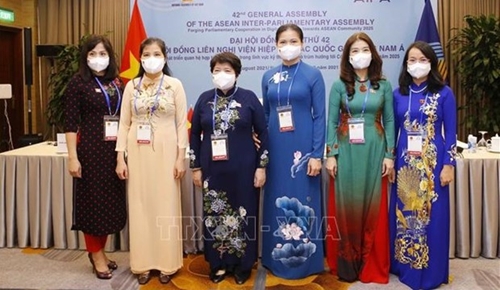Speaking to the press on the outcomes of the freshly-ended 42nd AIPA General Assembly relating to women’s empowerment, especially in the context of the pandemic, Nga, who is a National Assembly deputy, said difficulties and challenges are even greater in the context of the COVID-19 pandemic because women and children are still the most vulnerable.
According to Nga, the COVID-19 pandemic is posing many difficulties and challenges for women in the field of information technology because they lack technology application skills and have no experience working in an international environment, while hidden dangers of social networks make women and girls more susceptible to becoming victims of technology crimes.
    |
 |
|
The Vietnamese delegation at the 42nd AIPA General Assembly |
It is necessary to have a mechanism to assist women in getting access to information and fully understanding the State's support policies and create a channel to provide information suitable to women's habits and conditions, she said.
Nga also underlined the importance of having policies to help women to access information technology to narrow the gender gap in the digital field.
The official highlighted the importance of solutions that ensure effective and substantive participation and equal enjoyment of people in building the digital economy.
To do this, she pointed out some key issues such as diversifying programs and communication methods to change people's perception of digital transformation and digital economy; implementing training and supporting programs for people and businesses; and identifying shortcomings, difficulties, and barriers of each population group.
Nga emphasized that the development of the digital economy must be a gender-sensitive process, and narrowing the current gender gap must be considered as a priority to ensure that women and men enjoy equal benefits from the digital economy.
In addition, attention should be paid to ensuring that the female workforce is equipped with essential knowledge and skills to access digital technology.
According to Nga, in the current context, AIPA member parliaments need to cooperate more closely to be able to support women in dealing with the problems of the pandemic, natural disasters, and the digital transformation process to promote their contributions and creativity.
She also made several proposals such as prioritizing and protecting women against the pandemic, especially disadvantaged women and those on the front lines against the pandemic.
Nga called for strengthening research on the impacts of COVID-19 on women, adopting measures to coordinate and comprehensively support job opportunities, start-ups, income, and family care for groups of migrant women, female workers in industrial zones, and women-owned enterprises.
Source: VNA